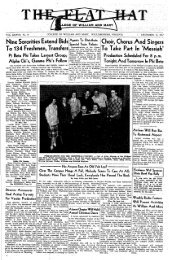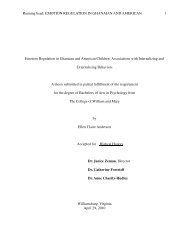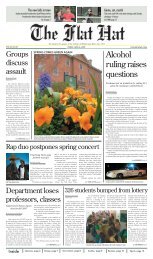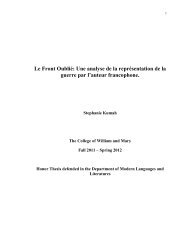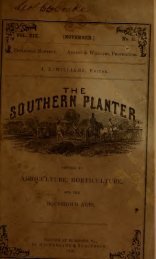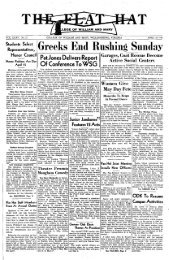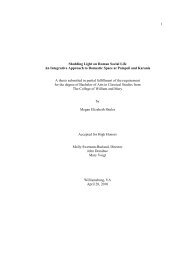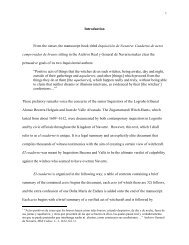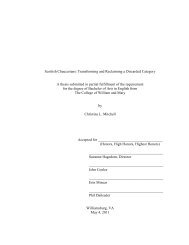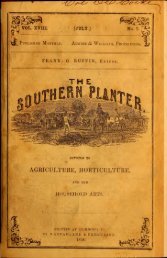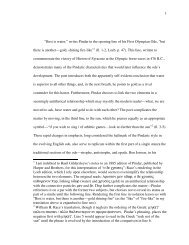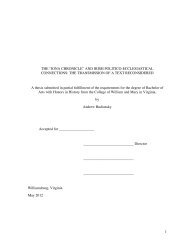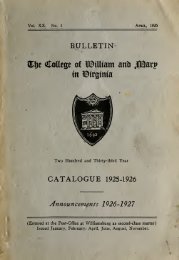Southern planter - The W&M Digital Archive
Southern planter - The W&M Digital Archive
Southern planter - The W&M Digital Archive
Create successful ePaper yourself
Turn your PDF publications into a flip-book with our unique Google optimized e-Paper software.
1859.] THE SOUTHERN PLANTER. 425<br />
dencrs to collect their own seeds, with the<br />
exception of some ornamental or rare botan-<br />
ical plants.— Germantown Telegraph.<br />
From the American Agriculturist.<br />
Enlarging a Farm Without Buying<br />
Land.<br />
If a man does not know how much land<br />
he actually owns, and gets no benefit out of<br />
that part with which he is unacquainted,<br />
and then is informed that he has more, and<br />
is told how to use it, why^ is not this equivalent<br />
to the purchase of more acres? Farm-<br />
ers arc often heard to exclaim :<br />
" Oh that I<br />
were rich enough to buy a little more land,<br />
then T could fatten more cattle and sheep,<br />
and I could carry more grain to market !"<br />
Now, to such men, at least to some of them,<br />
we beg leave to say, your farms are already<br />
larger than you suppose. You seem to<br />
think that your ownership extends only six<br />
inches deep into the earth ; but this is a<br />
misapprehension. It is not very strange,<br />
however, since all the former owners of the<br />
soil had the same idea, and the Indians<br />
from whom your ancestors bought or stole<br />
the land, .were content with only the surface,<br />
just enough to hunt upon and to grub<br />
a few roots out of. But this is all a mistake,<br />
as you will see on reflection. Exam-<br />
ine' the title deeds to your land and see if<br />
there is any limit to your rights in a downward<br />
direction. You will not find any; we<br />
know you won't.<br />
Now, therefore, do not fear to go at once<br />
and take possession of the rest of your<br />
farm. * It is virgin soil, covered over with<br />
only a few inches of partly worn land ;<br />
and<br />
it will return you fine crops if you will only<br />
lay it open to the sun and air, or mix it<br />
with the soil you have long cultivated. Perhaps<br />
it will not be wise for you to try to<br />
use it all the first year ; use a little modera-<br />
tion in entering upon your new property,<br />
for your own sake and for the farm's sake.<br />
[In connection with the advice here given,<br />
it may be well for the reader to turn back<br />
to page 71 (March No.,) and study what is<br />
said about plowing deep and plowing shallow.<br />
Ed.]<br />
Here is what some writer has said on the<br />
subject—not strictly correct perhaps, but<br />
highly suggestive : " At the present time,<br />
the average crop of wheat per acre in Great<br />
Britain on a soil cultivated for centuries, is<br />
about double that produced on the compara-<br />
tively new soil of Ohio. Why is this?<br />
Simply because the leading British farmers<br />
are educated men, and apply their work<br />
wisely. <strong>The</strong>y pay back to the earth what<br />
they borrow from her; they endeavor by<br />
every means in their power to enrich their<br />
ground, and in return it enriches them. If<br />
American farmers, instead of laboring to<br />
double the number of their acres, would endeavor<br />
to double their crops, they would<br />
find it a saving of time and toil, and an in-<br />
crease of profit. . . . Many<br />
men never<br />
think of digging ten inches into the soil,<br />
unless they have dreamed about a crock of<br />
gold, hid in the earth ; but if they would<br />
set about the work of digging in earnest,<br />
every man would find his crock of gold<br />
without the aid of dreams or devination."<br />
We once heard of some remarkable strawberries<br />
raised in a neighboring town, and<br />
called the " Washington Excelsior " strawberry.<br />
Rumor said that the leaves were<br />
large, vividly green all summer, the fruit<br />
large and abundant for a long time, and not<br />
diminished by the severest droughts. <strong>The</strong><br />
plants were sold at a half a dollar apiece,<br />
and were considered cheap at that price.<br />
Attracted by these wonderful stories of the<br />
new fruit, we went to see it and learn all<br />
about it. <strong>The</strong> plants were indeed beautiful,<br />
and the fruit very fine. But our eyes were<br />
opened, when Mr. Smith, the owner, told<br />
us frankly, that the plants were some common<br />
sort, the name of which he had forgotten,<br />
but that they were grown on a bed<br />
in the corner of his garden, which was made<br />
(/round for at least six feet deep. Why<br />
did this not account for the persistent verdure<br />
of the foliage and the size and abundance<br />
of the fruit ? Yet, the superior beau-<br />
ty of the plants and berries had attracted<br />
much attention in the neighborhood, and<br />
seemed to call for a high sounding name<br />
and so Mr. Smith dubbed them the Washington<br />
Exeelsior. Plainly, this man's strawberry<br />
bed was enlarged without fencing in<br />
more land.<br />
Mental Labor.<br />
<strong>The</strong> injurious effects of mental labor are<br />
in a great measure owing to extensive<br />
forcing in early youth, to sudden or misdi-<br />
rected study; to the co-operation of depressing<br />
emotions or passions, to the neglect of<br />
the hints of the body ; or to the presence<br />
of the seeds of disease, degeneration and<br />
decay in the system. <strong>The</strong> man of healthy



